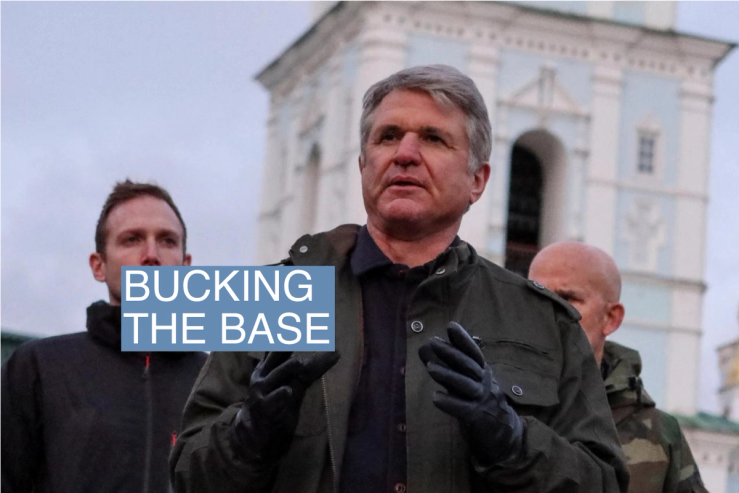The News
When it comes to the war in Ukraine, there seems to be a chasm between Republican lawmakers in Washington and their voters back home.
Among the GOP base, skepticism of U.S. involvement in the conflict runs deep. Fifty-nine percent of Republicans say the U.S. is doing too much to help Kyiv, according to a Washington Post-ABC News poll released over the weekend, similar to earlier results from Gallup and CNN.
But in Congress, Republican resistance to aid still appears to be shallow — despite some booming opposition from some of the party’s biggest conservative stars. An open letter last week opposing President Biden’s latest $24 billion request for Ukraine attracted just 29 GOP signatures from the House and Senate, led by Sen. J.D. Vance, R-Ohio and Rep. Chip Roy, R-Texas.
While that tally was up from the 19 lawmakers who in April vowed to oppose future assistance packages “unless they are linked to a clear diplomatic strategy designed to bring this war to a rapid conclusion,” it still represented just a small fraction of Capitol Hill Republicans.
Not every GOP lawmaker opposed to further Ukraine support joined the letters, suggesting they shouldn’t be taken as a precise whip count on the issue. Sen. Josh Hawley, R-Mo., a vocal opponent, signed neither letter, for instance. Pure numbers also don’t tell the whole story: The fight to cut off Ukraine’s assistance has been led by hardline conservatives like Rep. Marjorie Taylor Greene, R-Ga., who’ve made it a political centerpiece in this month’s chaotic fight over the federal budget. In the Senate, where support for Kyiv among Republicans is stronger, Sen. Rand Paul, R-Ky. has vowed to slow down any stopgap funding bill that includes Ukraine aid.
But a pair of recent votes during the House’s work on the National Defense Authorization Act over the summer also suggest that opposing Ukraine aid remains a minority position among GOP lawmakers.
An amendment from Greene that would have stripped $300 million in Ukraine funding from the bill got 89 Republican “yes” votes, while a larger number — 130 — voted against it. A separate push from Rep. Matt Gaetz, R-Fla. to prohibit further assistance for Ukraine garnered 70 Republican votes, while more than double that amount voted against it.
“The majority of the majority supports this,” House Foreign Affairs Committee Chairman Michael McCaul, R-Texas said of Ukraine aid last week, the same day that Ukrainian President Volodymyr Zelenskyy was on Capitol Hill meeting with members of both parties.
In this article:
Morgan’s view
The fact that Republican politicians seem much more supportive of Ukraine’s war effort than their constituents bodes well for the administration’s latest aid request (if Congress can ever agree on a budget).
But at some point, it seems likely political gravity will kick in, and falling support for Ukraine among GOP voters will further drag down enthusiasm among Capitol Hill Republicans. (It won’t help matters that Donald Trump isn’t exactly a solid Ukraine backer). That process could speed up as the White House comes back with more funding requests; if the latest $24 billion ask gets approved, the Biden administration estimates it will only last through the end of the year.
Some Republicans have pushed for more oversight of the funds, which may end up being the key to getting more assistance to the House floor for a vote in the near term. House Speaker Kevin McCarthy has insisted there would be no “blank checks” for Ukraine and last week said he and other members planned to press Zelenskyy on accountability for the funds. (McCarthy recently reversed plans to strike $300 million from a Pentagon funding bill under pressure from Greene.)
Former U.S. ambassador to Ukraine Bill Taylor recently told me that he was sure Ukraine funding would pass in the House (in part due to robust support among Democrats) but noted the question lies in how and in what form it actually gets to the floor.
“I’m not an expert on that and the Ukrainians are not experts on that, but once you get it to a vote — which it will get to — it will pass,” he said.
Room for Disagreement
Rep. French Hill, R-Ark., a supporter of Ukraine, believes that House Republicans (and the Biden administration) can actually persuade their colleagues who oppose aid to reverse themselves by communicating better about the degree to which other countries besides the U.S. are supporting Ukraine and articulating a clear “plan to win.” Both issues are topics that come up in conversations with constituents, Hill told a gathering about Ukraine recovery efforts at the Center for Strategic and International Studies last week.
“I think if we answer those questions persuasively, with both European contributors to that voice and American leadership both on the Hill and in the executive branch, we’ll lower that number,” Hill said, referring to the number of Republicans who voted in favor of Greene’s amendment to strike the Ukraine funds earlier this year.


